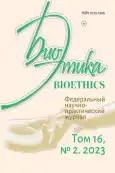Проблемы нормы и патологии в социологии здоровья
- Авторы: Светличная Т.Г.1, Смирнова Е.А.2
-
Учреждения:
- Северный государственный медицинский университет
- Череповецкий государственный университет
- Выпуск: Том 16, № 2 (2023)
- Страницы: 20-25
- Раздел: Практическая биоэтика
- URL: https://bakhtiniada.ru/2070-1586/article/view/253782
- DOI: https://doi.org/10.19163/2070-1586-2023-16-2-20-25
- ID: 253782
Цитировать
Полный текст
Аннотация
В настоящее время под нормой принято понимать некий средний, наиболее распространенный в обществе показатель. Понятие нормы менялось и, как следствие, в разные временные периоды выделялись различные эталоны здоровья (античный, адаптационный, антропоцентрический). В современном мире постмодерна идет интенсивная переоценка норм, меняется индивидуальное и общественное сознание, происходит размывание понятий добра и зла, нормы и патологии, где старую норму, противоречащую новым взглядам об успешности, можно отменить и ввести ее в статус патологии.
Изменения затронули и медицинскую практику. Так, реформы Ф. Пинеля (1793) наполняют безумие неким медицинским смыслом, состояние или поведение начинает определяться как медицинская проблема, требующая медицинского вмешательства. Психиатрия получает профессиональную власть над больным, а врач-психиатр получает контроль над душой и телом пациента. Психиатр, оставаясь истиной в последней инстанции, через постановку диагноза и механизмы стигматизации определяет место человека в структуре общества. Кроме того, в обществе создаются и новые риски. Развитие получают биомедицинские технологии, регулирующие процессы рождения, продления жизни и смерти человека.
Ключевые слова
Полный текст
Открыть статью на сайте журналаОб авторах
Татьяна Геннадьевна Светличная
Северный государственный медицинский университет
Email: statiana64@yandex.ru
ORCID iD: 0000-0001-6563-9604
доктор медицинских наук, профессор, профессор кафедры общественного здоровья, здравоохранения и социальной работы
Россия, АрхангельскЕлена Алексеевна Смирнова
Череповецкий государственный университет
Автор, ответственный за переписку.
Email: smirnova56@yandex.ru
ORCID iD: 0000-0002-9383-0649
кандидат социологических наук, доцент кафедры социологии и социальных технологий
Россия, ЧереповецСписок литературы
- Устав (Конституция) Всемирной организации здравоохранения. Принята 22.07.1946 г. Нью-Йорк. URL: https://med-prof.ru/spetsialistam/meditsinskaya-profilaktika/ normativnaya-baza-mp/ustav-vsemirnoy-organizatsii-zdravookhraneniya/ (дата обраще-ния: 24.05.2023).
- Вересаев В.В. Полное собрание сочинений в 4 томах. Т. 1. М.: Издательство «Правда». 1985.
- Одинцова В.В., Горчакова Н.М. Эмоциональ-ное благополучие как интегративная характе-ристика эмоциональной сферы // Вестник Санкт-Петербургского университета. Социо-логия. 2014. № 1. С. 69–77.
- Лисицын Ю.П. Общественное здоровье и здравоохранение. М.: ГЭОТАР-Медиа, 2010. 512 с.
- Афанасьева В.В., Бриленок Н.Б. Здоровый образ жизни как социокультурный феномен // Физическое воспитание, спорт, физическая ре-абилитация и рекреация: проблемы и перспек-тивы развитии: материалы VII Международ-ной электронной научно-практической конфе-ренции. Красноярск, 2017. С. 404–407.
- Евгеньева А.П. Словарь русского языка. В 4 т. Т. 2. К-О . М., 1999.
- Томнюк Н.Д., Данилина Е.П. Терминологиче-ские понятия нормы и патологии в медицин-ской практике // Международный журнал при-кладных и фундаментальных исследований. 2017. № 7. С. 214–216.
- Genel K. The Norm, the Normal and the Patho-logical: Articulating Honneth's Account of Nor-mativity with a French Philosophy of the Norm (Foucault and Canguilhem) // Critical Horizons. 2019. No. 22 (242). P. 1–19. doi: 10.1080/14409917.2019.1616482.
- Тетенков Н.Б. Норма и патология как гносео-логические категории // Контекст и рефлексия: философия о мире и человеке. 2020. № 3 (9А) С. 36–43.
- Светличная Т.Г., Смирнова Е.А. Медикализа-ция девиаций как инструмент социального контроля // Logos et Рraxis. 2022. № 2(21). С. 91–103.
- Фуко М. История безумия в классическую эпоху. СПб.: Университетская книга, 1997.
- Боязитова А.Н. Медикализация как социаль-ный процесс: дис. ... канд. филос. наук. Волго-град, 2007. 160 c.
- Абрамов В.А. Постструктурализм и психиат-рия: археология знания М. Фуко // Журнал психиатрии и медицинской психологии. 2019. № 1 (45). С. 5–13.
- Фуко М. Психическая болезнь и личность. СПб.: Гуманитарная академия, 2010.
- Великанова Л.В. Медикализация как способ институализации безумия // Актуальные во-просы экологии человека: социальные аспек-ты: сборник научных статей участников Меж-дународной научно-практической конферен-ции. В 3 т. Том 3. Уфа: РИО ИЦИПТ, 2017. С. 54–59.
- Светличная Т.Г., Смирнова Е.А. Теоретико-концептуальные подходы и результаты эмпи-рического изучения феномена медикализации (обзор литературы) // Logos et Praxis. 2017. № 3 (16). С. 145–160.
- Панова Е.Л. Трансформация понятий «здоро-вье» и «болезнь» как фактор революции в биомедицинских технологиях // Наука. Мысль: электронный периодический журнал. 2017. № 1–3. С. 58–62.
- Рыбин В.А. Эвтаназия. Медицина. Культура: Философские основания современного социо-культурного кризиса в медико-биологическом аспекте. М.: Книжный дом «ЛИБРОКОМ», 2009.
- Камалиева И.Р. Феномен пациента в условиях медикализации жизни: философско-антропологические аспекты проблемы // Со-циум и власть. 2021. № 4 (90). C. 47–54. doi: 10.22394/1996-0522-2021-4-47-54.
- Бенин В.Л. Тенденции дегуманизации отече-ственного высшего образования // Современ-ная высшая школа: инновационный аспект. 2018. № 2 (40). С. 108–116.
- Чапаев Н.К. Фромм и компетентностный под-ход: в поисках философии образования це-лостного человека ХХI века // Образование в регионах России: научные основы развития и инноваций: материалы V Всерос. научн.-практич. конф. Екатеринбург: РГППУ, 2009. Ч. 1. С. 12–14.
- Аблеев С.Р., Кузьминская С.И. Технологиче-ская дегуманизация образования: сущность проблемы и социально-психологические по-следствия // Вестник Московского универси-тета МВД России. 2019. № 6. С. 314–318. doi: 10.24411/2073-0454-2019-10363.
- Осин А.Я., Садова Н.Г. Непрерывное педаго-гическое образование преподавателей в усло-виях модернизации высшей медицинской школы // Pacific Medical Journal. 2004. № 3. С. 79–82.
Дополнительные файлы







